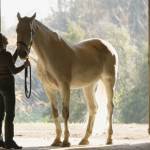Health Problems in Older Horses

Older horses and ponies, generally defined as those 20 years of age or older, make up a significant percentage of the equine population. These senior citizens are often able to continue working or performing well into their third decade, but they also have some unique health problems related to age.
Colic, weight loss, lameness, and respiratory problems such as heaves are the most common health conditions seen in older horses, though they are not limited to horses and ponies in their senior years. These problems as they relate to older equines are discussed in “Common Diseases of Older Horses.” Other health conditions may be related to an aging horse’s endocrine system, heart and circulatory system, kidneys, or liver. Formation and growth of various types of tumors can also threaten the health of the older horse.
Pituitary pars intermedia dysfunction (PPID), also known as equine Cushing’s disease, can strike a horse at any age, but is seen with greater frequency as horses age. This disease of the endocrine system is often suspected in older horses that grow a long, wavy hair coat that fails to shed in the spring. In addition to this characteristic sign, horses with PPID may show excessive thirst, frequent urination, muscle wasting, weight loss, lethargy, and elevated levels of glucose in the blood. Laminitis is a frequent complication and is often the first sign noticed by owners.
PPID is chronic and progressive, but horses can be made more comfortable by careful management. Regular farrier care, avoidance of feedstuffs with a high level of carbohydrates, aggressive treatment of infections, and treatment with pergolide are often included in a management plan for horses with this condition. Veterinarians can evaluate these equines and advise owners on medication use, while an equine nutritionist can answer questions about low-carbohydrate feeds and hay selection.
Diseases related to the heart valves are often found in older horses, although minor heart defects and abnormal cardiac sounds are found in many horses of all ages. In a normal heart, valves open under pressure to allow blood flow in one direction, but close tightly to block flow in the other direction. With age-related deterioration of the valves, the seal is no longer as solid and effective, and blood can be pushed back (regurgitated) through the valve. The aortic and mitral valves are the most commonly affected in older horses, with aortic regurgitation being the most common cause of congestive heart failure in older horses. These defects produce murmurs when the heart beats, though they are not the only causes of unusual cardiac sounds. Mitral regurgitation produces a systolic murmur, while aortic regurgitation results in a diastolic murmur. Echocardiography is the most reliable method of diagnosing the type and potential significance of valve function problems.
Liver disease in horses is fairly uncommon compared to other species. In horses, advanced age is accompanied by some shrinking of the liver and an increased sensitivity to toxins and carcinogens. Kidney problems are also not as common in horses as in aging small animals. Kidney malfunction can lead to imbalances of salt, potassium, and calcium. Weight loss and blood in the urine might be signs of carcinoma development in the kidneys. Incontinence is sometimes a problem in very old horses. In older mares, this may be related to poor conformation or injuries caused by breeding or foaling. In geldings, urinary incontinence is sometimes linked to a buildup of sediment in the bladder.
Tumors found in older horses are most often squamous cell carcinoma, melanoma, and lymphosarcoma. Among melanomas, those forming on the skin are the most commonly seen. Significance of tumors and their recommended treatment plans vary by the type, size, and location of the abnormal tissue.
Owners of older horses can help their equines stay healthy by keeping up with routine dewormings, hoof care, dental checkups, and vaccinations. Examining older horses on a regular basis and recording notes on weight, body condition, and other observations is a good way to keep track of any changing or progressing health concerns. Owners can ask veterinarians and equine nutritionists for advice on specific problems encountered by older horses.








